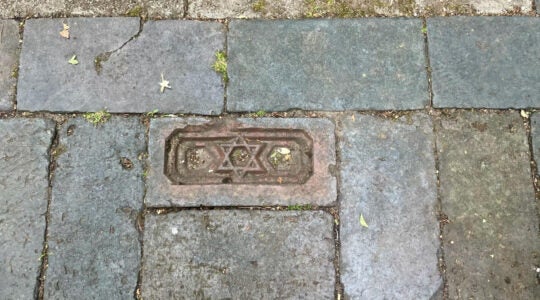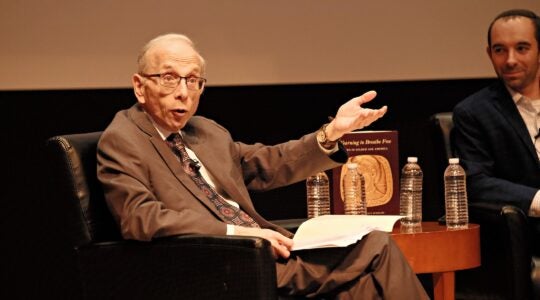Powerful new evidence has surfaced mandating disqualification of Professor William Schabas as the chair of the UN commission investigating alleged Israeli war crimes during the recent Gaza conflict.
In a written petition to have Schabas recused filed on Sept. 4, UN Watch, a Geneva-based NGO, showcased a July 17 BBC interview in which Schabas presumed Israel guilty. Although at the time of that interview there had been no ground offensive, Schabas declared “prima facie there is evidence of disproportionality” by Israel sufficient to declare the air strikes unjustified because “there are a huge number of civilian casualties on one side and virtually no civilian casualties on the other.” The BBC interview is damning evidence sufficiently questioning Schabas’ impartiality under a longstanding due process principle that judges or investigators “should be, and should be seen to be, free of commitment to a preconceived outcome.”
Also on Sept. 4, Schabas championed his commission’s adjudicatory relevance in a CNN interview, stating: “the International Criminal Court is sitting in the wings,” and the commission will likely “provide materials that would go to the prosecutor of the ICC and so that’s a pretty big stick if we come to the conclusion that there were war crimes.” The Palestinians recently disclosed plans to join the ICC, which might be considered encouraging news to Schabas, who has repeatedly promoted prosecuting Palestinian claims against Israel at the ICC. Schabas’ admission to CNN that his commission aims to assist any ICC prosecution lends greater significance to a 2012 address he delivered to the Russell Tribunal, a London-based pro-Palestinian NGO that even Judge Richard Goldstone [the author of a controversial UN report on Israeli actions during the last Gaza war] discredited as “one sided.” Schabas quipped in that speech: “My favorite would be [Israeli Prime Minister Benjamin] Netanyahu within the dock of the International Criminal Court.”
The BBC and CNN interviews confirm that Schabas should be disqualified either for actual bias or the appearance of bias. As UN Watch argues, the BBC interview demonstrates “commitment to a preconceived outcome” of “Israeli guilt for war crimes” that “constitutes an overt case of actual bias on the very question that the [UN commission] members are meant to impartially assess.” These circumstances distinguish Schabas’ case from that of Nabil Elaraby, current head of the Arab League, who was part of the 2004 judicial panel at the International Court of Justice (ICJ) that issued an advisory opinion on “Legal Consequences of the Construction of a Wall in the Occupied Territory.” The ICJ refused to disqualify Elaraby notwithstanding anti-Israel sentiments he expressed in a newspaper interview prior to joining the Court. The ICJ reasoned that Elaraby “expressed no opinion on the question put in the present case” during that interview. In stark contrast, Schabas’ opinion of prima facie guilt by Israel relates directly to the very issues and events his commission is supposed to assess.
Assuming Schabas’ BBC interview does not show actual bias — and it does — his many antagonistic comments about Israel and its leaders certainly constitute the “appearance of bias. In the Elaraby case, a dissenting judge criticized the majority for ignoring appearance of bias simply because the ICJ statute did not expressly provide for it as a basis for disqualification. As the dissent explained, consistent with due process, “fair and proper administration of justice requires that justice not only be done, but that it also be seen to be done … whether or not [court] statutes … expressly require” it to be so.
Moreover, there is persuasive statutory authority demanding that Schabas be disqualified because of the appearance of bias as assessed by an objective reasonable person aware of all circumstances. For example, UN War Crimes Courts have a rule that reads: “a judge may not sit at a trial or appeal in any case in which his impartiality might reasonably be doubted on any substantial ground.” The Rome Statute governing the ICC contains similar language and ICC Rules of Procedure and Evidence expressly identify as a “ground for disqualification of a judge” the “[e]xpression of opinions, through the communications media in writing or in public actions, that objectively, could adversely affect the required impartiality of the person concerned.”
Schabas himself is a firm proponent of disqualification on account of appearance of bias. In an extensive and respected work he authored on UN war crimes tribunals, Schabas embraced the impartiality standards articulated by the Appeals Chamber for the International Criminal Tribunal for the Former Yugoslavia (ICTY) that “a judge should not only be subjectively free from bias, but also … there should be nothing in the surrounding circumstances that objectively gives rise to the appearance of bias.” He quoted ICTY language that “[t]here is an unacceptable appearance of bias if … the circumstances would lead a reasonable observer, properly informed, to reasonably apprehend bias.” Summarizing in his own words, Schabas instructs: “A judge may be disqualified in any case in which he or she has a personal interest, or some other association which might affect his or her impartiality. The test is one of ‘reasonable apprehension of bias.’”
There is ample precedent from war crimes’ tribunals for disqualifying judges under the “reasonable apprehension of bias” test. Justice Geoffrey Robertson, president of the Appeals Chamber for the Special Court of Sierra Leone, for example, was recused because fellow judges determined that “a reasonable man will apprehend bias” from past comments he had made about events in Sierra Leone. Schabas’ extensive criticism of Israel over many years and particularly concerning this year’s Gaza conflict presents an even more compelling basis for recusal and the UN Human Rights’ Council must disqualify him consistent with due process and standard statutory authority.
Daniel D. Edelman is an attorney who lives in Teaneck, N.J.
The New York Jewish Week brings you the stories behind the headlines, keeping you connected to Jewish life in New York. Help sustain the reporting you trust by donating today.




